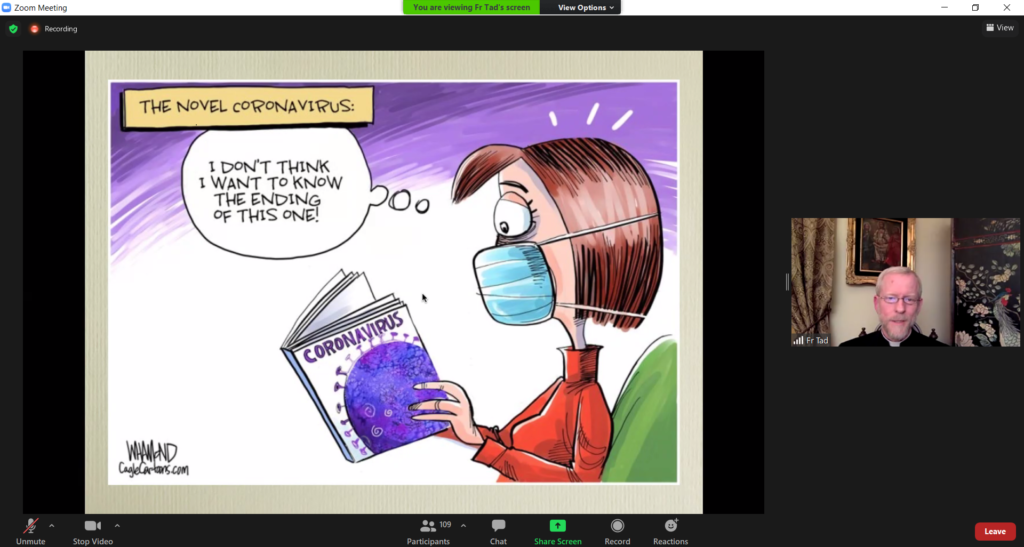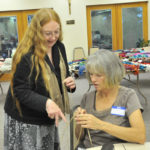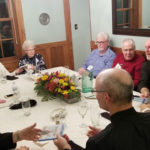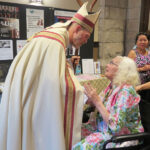
Father Tad Pacholczyk speaks about vaccines during a virtual presentation, hosted by the Rossi Center for Faith and Culture at Newman Catholic Student Center in Iowa City, March 3.
By Lindsay Steele
The Catholic Messenger
IOWA CITY — Bioethicist Father Tad Pacholczyk planned to talk about ventilators and vaccines during a virtual Newman Catholic Student Center presentation on March 3. Ultimately, he decided to focus on vaccines “given the prominence of vaccine issues in the news these days,” and answered questions that have been on the minds of many Catholics since the first COVID-19 vaccines were administered late last year.
Father Pacholczyk, who earned his doctorate in neuroscience from Yale University and did post-doctoral work at Harvard University, is the Director of Education at The National Catholic Bioethics Center in Philadelphia. He began his presentation, sponsored by the Rossi Center for Faith and Culture, with an overview and history of COVID-19. While most people don’t get seriously ill from COVID-19, “the outcome can be quite terrible” for those who progress through the later stages of the disease. “It’s a strong and compelling argument for the importance of developing vaccines.”
One concern on the minds of many Catholics, he said, has been the association between abortion-derived cell lines and the vaccine, and whether it is morally permissible to receive vaccines with connections to these cell lines. Abortion-derived cell lines are “ubiquitous” in vaccine development, he said. A majority of these cell lines are copies of kidney cells derived from a 1972 abortion in Netherlands. “Virtually every university and pharmacy company has stocks of these cells, and they are employed very widely.”
“Lots of Catholics are hearing about this for the first time in their lives due to the pandemic,” but in 2005 the Vatican first addressed the morality of vaccines developed with abortion-derived cell lines. Catholics may, in good conscience, use these vaccines if they are necessary for the health of others and the alternatives are ineffective, inaccessible or cause serious side effects, Father Pacholczyk said.
The Vatican said in a December statement, “When ethically irreproachable Covid-19 vaccines are not available,” it is “morally acceptable to receive Covid-19 vaccines that have used cell lines from aborted fetuses in their research and production process.”
All three U.S.-approved vaccines used abortion-derived cell lines in the research process, Father Pacholczyk said. However, the Johnson & Johnson vaccine, which received Emergency Use Authorization from the U.S. Food and Drug Administration on Feb. 27, presents a greater ethical issue because it uses abortion-derived cell lines in its production. Therefore, he encourages Catholics to choose the Pfizer or Moderna vaccine, which did not use abortion-derived cell lines in production. Catholics may receive the Johnson & Johnson vaccine in good conscience if the alternatives are inaccessible or would cause serious side effects. For example, someone with a polyethylene glycol allergy should not take the Pfizer or Moderna vaccine due to risk of a severe allergic reaction.
Some Catholics refuse vaccines as a form of protest. However, he advises more effective ways to advocate for change. He encourages concerned Catholics to raise awareness on the use of aborted cell lines in vaccine development and ask pharmaceutical companies to consider more ethical alternatives. “Write letters to the editor, make other efforts to make this known publicly,” he said. “It has more effect than just one person saying, ‘I’m not going to get vaccinated.’”
Father Pacholczyk said some people question the safety of the vaccines because of the speed at which the vaccines were created. “No vaccine prior to COVID-19 has ever been created this quickly. Four to 10 years represents a more typical timeline.” However, the emergence of MRNA technology, which has been “a long time in coming, with a good decade of solid work,” allowed for the quick development of COVID-19 vaccines. “It just happened to be a confluence of events where we got technology to the point where it could be employed in a pandemic and result in the rapid creation of a vaccine.” About 400 vaccines are under development, with more than 30 in clinical trials, he said.
The vaccines “have been tested in tens of thousands of people.” Risks are always involved in new treatments and vaccines, so scientists are tracking adverse effects and working to determine causality. “If they see a verifiable risk,” they can scale back vaccine distribution and look at an alternative path forward; so far, that hasn’t been necessary. “This is part of the process of securing public health to the point where we are doing it intelligently, rationally and not exposing people unnecessarily to risk.”
A few presentation participants asked if the vaccine causes infertility; pregnant individuals were not part of the initial trials. Father Pacholczyk said there was some concern that the spike proteins in the vaccine might attack the placenta, however, researchers found the risk to be “virtually nonexistent… It’s something that grew legs in the mass media, but there is no scientific basis for it. There is no grounds for worry.” Still, some vaccine companies have been cautious about recommending pregnant women get vaccinated until more research can be done. “Let’s finish these kinds of studies before going wholesale into vaccinating pregnant women.”
Herd immunity is the ultimate goal of vaccination, but Father Pacholczyk believes wide-scale mandates would be unethical. “The fact is that expected population health benefits from widespread vaccination do not automatically create a moral obligation for everyone to be vaccinated,” especially with still-limited knowledge of side effects, adverse effects, efficacy and long-term consequences. Herd immunity does not require universal vaccination, he noted. “We must rather seek to convince people, through careful and appropriate explanation, of their personal need to receive a vaccine, and freely choose to do so on their own initiative.” Individuals must use “prudence” to determine whether the benefits to themselves and others would outweigh the risks.
Father Jeff Belger, priest director of Newman Catholic Student Center, closed the evening in prayer, asking God to comfort those who have had COVID-19 and those who are vulnerable to severe illness; families having to make decisions between income and safety; persons without health insurance; and undocumented immigrants who fear seeking medical care. “May the church be a sign of hope, comfort and love to all.”
About the Rossi Center for Faith and Culture
Dr. Nicholas Rossi, Emeritus Professor of Cardiothoracic Surgery, and his late wife, Helen, founded the Rossi Center for Faith and Culture to create enhanced opportunities for Newman Center students to learn and discuss how faith and culture interface in their daily lives. The center-sponsored programs and institutes allow students to hear talks from local faculty/professionals and nationally known speakers and experts in their fields about how they incorporate faith into areas of science, art, business, politics, athletics, etc. The center also supports a Fellow for Faith Formation. For more information, go to www.rossicenterforfaithandculture.org.











